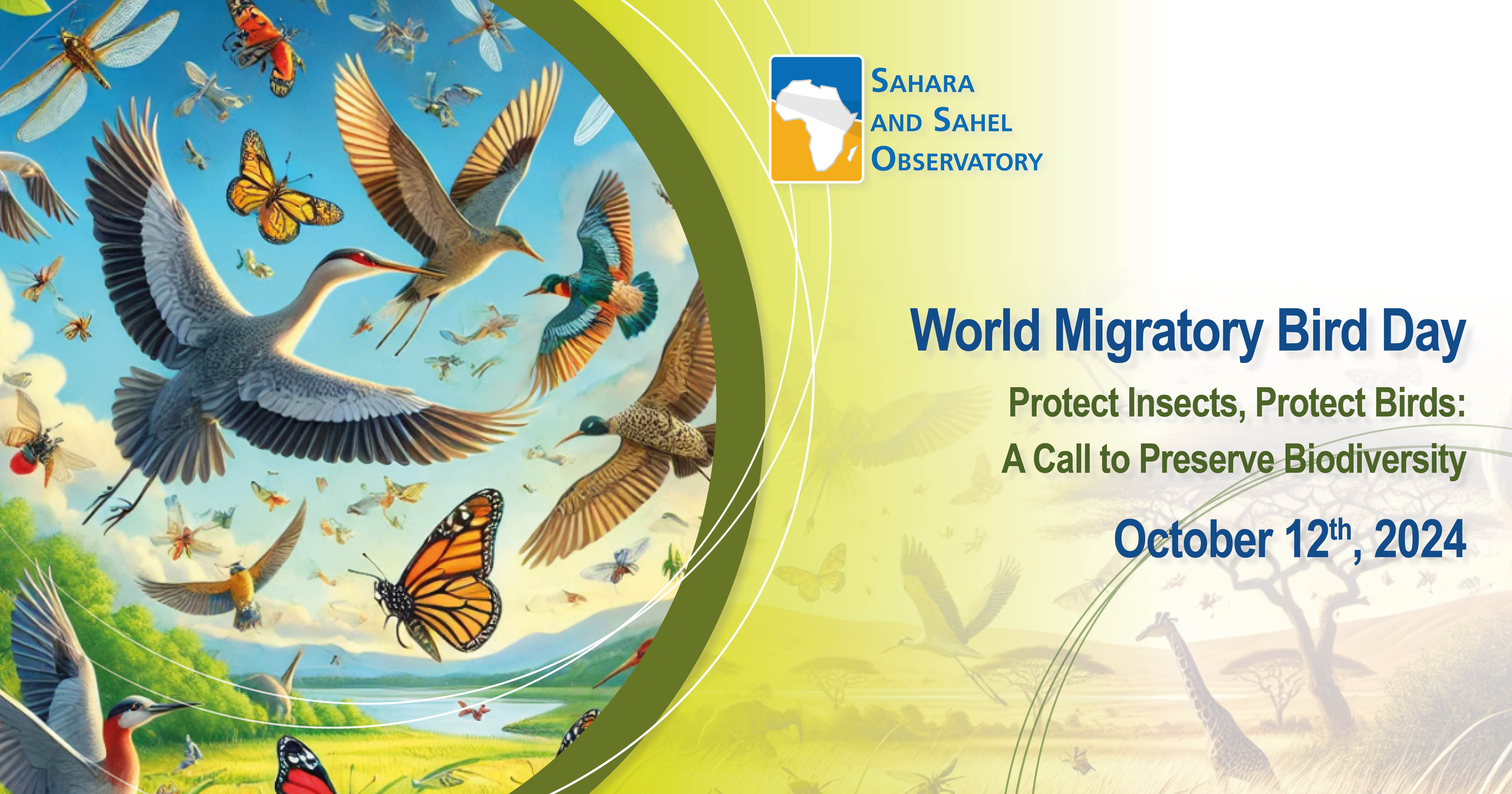World Migratory Bird Day - October 12, 2024 | "Protect the insects, protect the birds: a call to preserve biodiversity"

Mrs Yosr Turki
Specialist in environmental sciences and marine biology,
Sahara and Sahel Observatory
Would you give up being in the body of a barn swallow? A small bird with tapered wings, born in the countryside of Europe. As autumn begins, you cannot resist the call that pushes you to undertake an extraordinary journey: migrate to the warm lands of Africa. You travel thousands of kilometers, crossing the Mediterranean and the vast Sahara Desert to reach the savannahs and tropical forests of West Africa. Such a journey is simply vital for you. Every year, these impressive journeys are accomplished by millions of swallows and billions of other migratory birds, often synchronized with natural cycles... especially those of insects, an essential resource for their survival.
For centuries, humans have tried to understand bird migrations. Aristotle believed that some species hibernated or merely transformed. Later, technological advances, such as ringing and satellite tracking, helped us discover the extent of these migrations. Some species travel thousands of kilometers with surgical precision and an extraordinary ability that relies on celestial landmarks, but also on a sense that humans simply don’t have: magnetoception, the ability to perceive the Earth's magnetic field.
However, these migrations, which demonstrate the resilience and instinct of birds, are put to danger. Migratory birds must overcome immense challenges: fatigue, predation, and above all threats caused by humans. Among these threats, the disappearance of insects is particularly alarming.
Insects and birds: a vital link for ecosystems
Celebrated every year, World Migratory Bird Day highlights the need to preserve these species. In 2024, the campaign carries a clear message: "Protect insects, protect birds". Insects, a vital food resource, are essential to the survival of birds, particularly during their migratory stopovers where they fill up their energy reserves. Bird migrations are often synchronized with peaks in insect abundance, like a natural dance between species.
The Djoudj National Bird Sanctuary, located in northern Senegal, is a perfect example of this inter-reliance between birds and their environment. Listed as a UNESCO World Heritage Site, this park is a crucial ecosystem, both for the preservation of migratory species and for maintaining regional ecological balances. During his speech on January 15, 2024, the Senegalese Minister of the Environment highlighted the importance of Djoudj, not only for its biodiversity, but also for the ecological services it provides. By welcoming millions of migratory birds, the park advocates for the urgent need to protect the natural habitats and food resources essential to these species. Sustainable management of the park is therefore essential to ensure the survival of the birds it shelters, to face the growing threat of climate change and anthropogenic pressure.
This urgent need for protection also extends to other ecological factors such as the alarming decline in insect populations. A study published in Science shows that approximately 9% of insects disappear every decade, mainly due to deforestation, intensive agriculture, excessive use of pesticides and climate change. This decline has direct repercussions on birds. According to the World Ecological Society of Birds, nearly 10% of the 2,000 species of African birds, including several migratory species, are now threatened with extinction.
Ecosystem accounting. natural capital at the heart of ecosystems
Ecosystem accounting, which includes the concept of natural capital, makes it possible to assess the value of ecosystems in terms of services provided, particularly in the essential relationship between birds and insects. Insects are essential for pollination, the decomposition of organic matter and the food chain and are vital for many species of birds, especially migratory ones. When ecosystems are degraded - for example, by the excessive use of pesticides - insect populations decline, directly threatening the birds that depend on them. By integrating this relationship into Ecosystem Accounting, we highlight the role of insects as natural capital essential to the survival of birds, which contributes to the resilience of ecosystems.
The example of the Amur Falcon (Falco amurensis), a small species of raptor whose migration in Asia and Africa is closely linked to the abundance of "wandering glider" dragonflies, illustrates how crucial these interconnections are.
Species such as the European pied flycatcher (Ficedula hypoleuca), a small passerine bird that has become rare and protected, are affected by climate change, seeing the insects necessary for the nutrition of their young disappear before they hatch.
A call to action,
Protecting insects is therefore undoubtedly essential for the survival of migratory birds. Faced with this challenge, the 2024 campaign calls for urgent action: restoring natural habitats, reducing the use of pesticides and promoting sustainable agricultural practices such as organic farming. This is not only about protecting iconic species such as the swallow or the flycatcher, but also about preserving the health of the entire ecosystem.
Because migratory birds have different cycles in the two hemispheres, the world day is celebrated in 2024 over two days, October 11 and 12. The message is to encourage citizens around the world to participate in events to raise awareness about the protection of birds and insects and to adopt concrete actions for their well-being. Creating suitable habitats, limiting the use of pesticides, preserving water, promoting biodiversity, supporting conservation initiatives, promoting healthy soil, are all essential elements. By taking care of these insects, we not only help the birds, but we contribute to the preservation of a biodiversity essential to the survival of our planet. Gaia.
In short, protecting insects is protecting birds - and thus preserving the fragile balance of nature around us.
